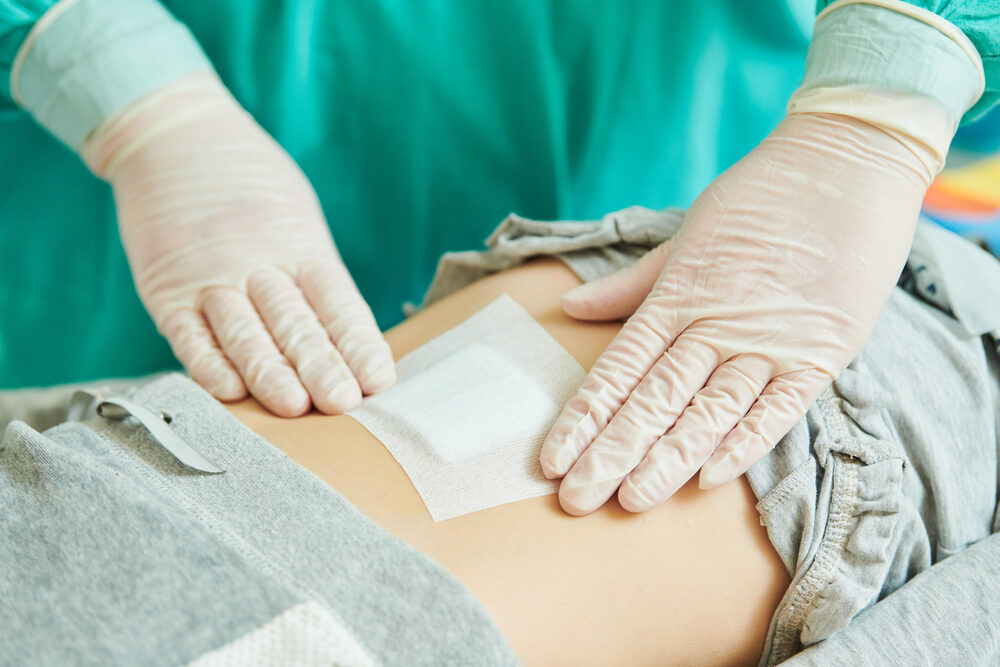
☝️ The most important facts in brief
- Children's bodies react differently to medication and interventions than the bodies of adults. For this reason alone, paediatric surgery is an important specialist area that ensures that young patients receive the best possible treatment.
- Paediatric surgeons work in clinics and private practices and are specially trained in the diagnosis, treatment and aftercare of surgical problems in children.
- To become a paediatric surgeon, you have to study medicine for 6 years and complete a further 6 years of specialist training.
📖 Table of contents
A paediatric surgeon is a specialised doctor whose surgical skills and knowledge are precisely tailored to the needs of children and adolescents. From trauma surgery to neurosurgery to paediatric surgery Surgery paediatric surgeons cover a broad spectrum of different organ systems. Specialist training is demanding and takes 6 years. Find out more about how paediatric surgeons work and what opportunities and challenges this medical profession offers!
Are you interested in studying medicine?
We will be happy to advise you free of charge about your options for studying medicine, including advice on studying medicine in another EU country, which is fully recognised in Germany.
What exactly do paediatric surgeons do - the tasks and activities
Paediatric surgery treats children and adolescents with various illnesses and injuries. The paediatric surgeon corrects malformations, fixes complicated bone fractures or removes tumours. In principle, all fields of activity from regular surgery are also represented in paediatric surgery.
In addition to the actual operation, paediatric surgeons are also involved in diagnostics, treatment planning and aftercare.
Paediatric surgery comprises various specialist areas
In addition to general paediatric surgery, many other specialist areas are integrated into the field of activity of these specialists. We would now like to briefly introduce you to the most important aspects of the range of services offered by paediatric surgery.
Neonatal surgery
One of the most important procedures in this specialist area is the correction of congenital malformations. These operations are often complex and require specialised knowledge and expert care for young patients. Special paediatric anaesthesia by specialist anaesthetists is essential for operations on the youngest patients in particular. Examples of malformations in newborns include diaphragmatic hernias, heart defects and intestinal obstructions.
Paediatric urology
Paediatric urology treats diseases of the urinary tract and reproductive organs in children. Bladder problems and kidney malformations are common problems that paediatric surgeons deal with in this speciality.
Paediatric traumatology
Injuries to children are treated in paediatric traumatology. This promises better results and fewer complications than treatment in regular trauma surgery. Injuries to children often require special treatment methods, as attention must be paid to growth plates and other special features so as not to jeopardise the child's future development.
Surgical paediatric oncology
Childhood cancers often require surgical intervention. In particular, tumours and their metastases are removed from the body. Close collaboration with oncologists and radiologists is important in this area of paediatric surgery in order to offer the best possible chances of recovery.
Paediatric neurosurgery
As a specialised field of paediatric surgery, paediatric neurosurgery deals with diseases, damage and malformations of the nervous system. Operations on the brain and spinal cord require the utmost precision. Just as in other areas of paediatric surgery, precise knowledge of child development is also important here in order to carry out treatment in such a way that neurological deficits are minimised and young people can develop in the best possible way in the future.

Paediatric surgery in Germany - the DGKCH
The care of children and adolescents is of great importance and should not be a standard part of regular surgery. The DGKCH is committed to this. It is the specialist society in Germany that decisively promotes the further development of treatment methods and quality assurance.
The board, which is elected by the members, regularly organises meetings and further training courses at which members can find out about the latest developments in their field. On the DGKCH website, doctors from all specialities and other interested parties can also find lots of general information about paediatric surgery. In recent years, the DGKCH has made a decisive contribution to improving paediatric surgery in Germany and has the declared aim of continuing this trend.
The Professional Association of Paediatric Surgeons in Private Practice in Germany (BNKD)
While the DGKCH is responsible for all paediatric surgeons, the BNKD represents the interests of paediatric surgeons who work outside of hospitals. It is also committed to providing the best possible surgical care for young patients. The association offers further training and courses to ensure high quality in private practices.
On its website, the BNKD provides extensive information on current developments and guidelines as well as a practice finder that enables patients to quickly find a suitable paediatric surgery practice.
Do children always have to be treated in paediatric surgery?
Paediatric surgeons have dealt intensively with the special requirements for treating children during their training. It therefore makes sense to treat patients into adolescence in paediatric surgery and not in regular surgery. The doctors working there are very familiar with operations in children and can therefore perform the required operation in a particularly professional manner.
The best therapy for a child can depend greatly on their age
One good reason for treating children in paediatric surgery rather than in regular surgery is the paediatric surgeons' specialist knowledge of child development. This can be illustrated with an example from paediatric traumatology: A displaced bone fracture in a small child can in many cases be treated with a simple plaster cast, as so much remodelling takes place in the bone anyway due to the strong growth in this child that it "grows into place". In an older child or adolescent, on the other hand, an operation would be necessary to set the fracture.
This is just one of many examples that doctors need to be familiar with. Children are not small adults, and the various clinical pictures and their best possible treatment can best be assessed in paediatric surgery.
Training: How to become a paediatric surgeon
To become a paediatric surgeon, you must complete a degree in human medicine. Due to the NC restrictions, it is often difficult to get a place here. A top A-level or other excellent qualifications are required not only in Heidelberg, but also at almost all other German universities. Many prospective doctors therefore decide to study abroad.
After studying medicine, you will then have to complete specialist training in paediatric and adolescent surgery.
Medical studies
The medical degree programme lasts 6 years and ends with the state examination. During your studies or afterwards, you have the opportunity to earn the title of "Dr med" by working in research and writing a doctoral thesis. However, this is not a prerequisite for specialist training in paediatric surgery or any other subject.
During your studies, you will learn the basics and specialist knowledge from various fields. You will learn about human anatomy and possible diseases and gain important experience in the university hospital.
After completing your studies, you will be a doctor and now have the opportunity to specialise further.
Further training as a specialist in paediatric and adolescent surgery
Once you have completed your medical studies, you can work as a junior doctor at a clinic. At the same time, you can begin further training to become a specialist in paediatric and adolescent surgery.
This apprenticeship lasts 6 years and requires you to work in the following areas:
- 48 months in paediatric surgery
- 6 months in the emergency room
- 6 months in paediatric intensive care medicine
- The remaining 12 months of training can take place in a suitable department of your choice. These include paediatric and adolescent medicine, paediatric oncology or neonatology at a university hospital.
After completing your specialist examination, you will be a paediatric surgeon and can apply for relevant positions.
Free information material
Studying medicine abroad 🎉
Order your info pack now, find out more about the Studying medicine abroad and get started as a medical student!





